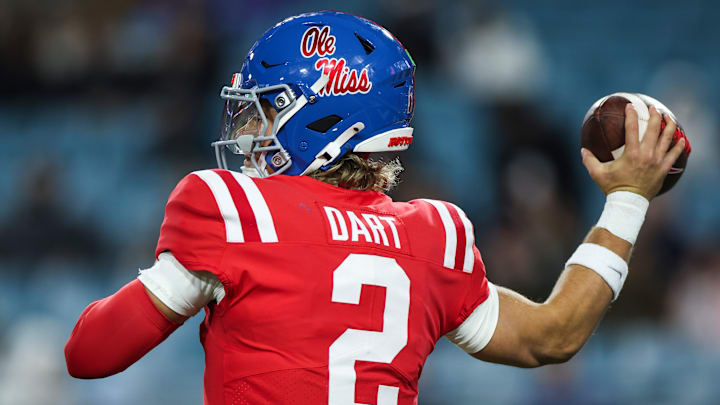
Of course, Dart is not completely without talent. As mentioned, he has improved every year of his career, he is a decent athlete and runs the Ole Miss offense at a high level. That said, his game and physical skills are severely limited.
First, Dart is on the shorter end of the spectrum for an NFL quarterback. The league has done a much better job of adapting to passers with these height deficiencies recently, but with Dart, these physical limitations extend to his arm. Consistently lauded for his ability to throw with touch, he often seems to be doing so simply because he doesn’t possess the arm strength required to fire the ball into tight windows.
When throwing the ball downfield, his passes tend to hang on him and certain throws will just not be available to a player whose arm is limited in this way.
Regardless of his physical skill set, the most important part of Dart’s evaluation will be his ability to adapt to a “real” offense in the NFL. While he engineered the Rebel’s offense well over the last several seasons, he was rarely asked to make any decisions. Instead, the throws were placed in front of him, and he was making pre-snap reads to decide where he was delivering the ball, and he did so no matter what. A large portion of this offense was attached to slot choice routes which left him watching one route and throwing it off the break.
In the NFL, these plays do still exist. Look no further than Jalen Hurts and the Philadelphia Eagles, who have built a top offense with a quarterback who has some similar limitations. However, Hurts' rushing ability gives him an x-factor that Dart doesn’t have to fall back on. Furthermore, the Eagles were never able to tailor this offense perfectly to Hurts until they had two elite receivers in A.J. Brown and Devonta Smith. The same will have to be done to aid Dart.
If the offense has to be simplified to this level, the rest of the unit has to be loaded with talent to overcome the lack of a mental strain put on the defense.
